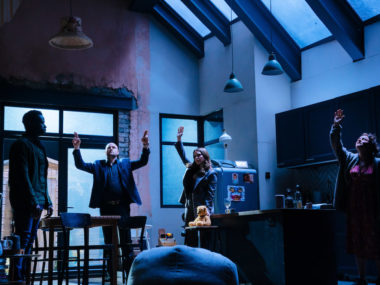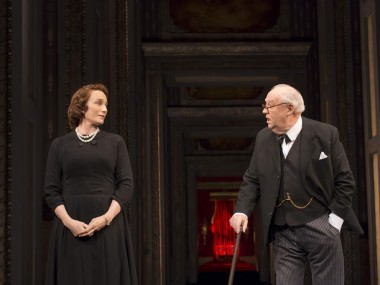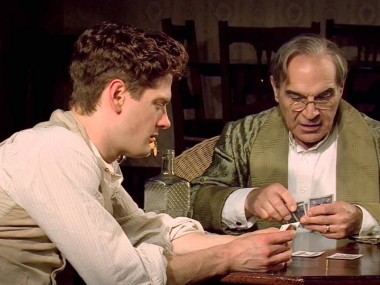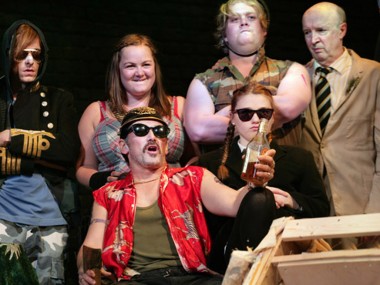Punch, Apollo Theatre
Friday 26th September 2025
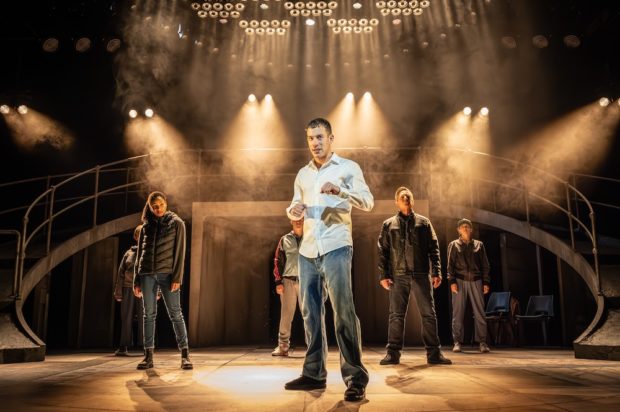
Broken Britain has a big problem with youth. About a million of those aged 16 to 24 are NEETs (not in education, employment or training), some 13 per cent of this age group. Many working-class youngsters are responsible for crime, violence and anti-social disorder. Teens who run wild; an epidemic of overt shoplifting. But as well as holding individuals responsible for their actions, it has to be said that the UK, with its huge welfare cuts over the past decade, has effectively abandoned many of its young people. Pools of surplus DNA, surplus to requirements, a surplus of the undervalued. But occasionally, just occasionally, there’s an exception to this bleak reality.
One such exception is illustrated by Punch, an energetically theatrical retelling of an inspiring true story by James Graham, Britain’s go-to state-of-the-nation playwright. It’s about a 19-year-old lad, Jacob Dunne, who in July 2011 punched a man in an unprovoked attack in Nottingham city centre. That proved fatal: his victim, James Hodgkinson, a trainee paramedic aged 28, died in hospital nine days later. Hit by a single punch, he was unlucky. Jacob got a two-and-a-half-year custodial sentence for manslaughter, and served 14 months. On his release, he was homeless, unemployed and struggling to get his life together. With no qualifications, unreliable mates and a history of drug dealing, things looked bad. Then he got lucky.
How so? Well, James’s parents, Joan and David, were dissatisfied with the lack of answers about their son’s death so, after the initial shock, and through the intervention of social workers, they gradually became interested in the idea of restorative justice. Despite their misgivings, they contacted Jacob and began the process of finding answers to what seemed like an inexplicable act of violence. Jacob, for his part, gradually became more courageous too, and, with Joan and David’s encouragement, successfully began to change his life. Eventually he got a university degree in Criminology and in 2020 presented The Punch, an award-winning BBC Radio 4 series exploring the impact of violent crime and the potential for healing and redemption.
Two years later, Jacob’s book, Right from Wrong, told his life story from sweet child who loves his mother to angry, hard-drinking and hard-fighting lad, then to a campaigner against violence, promoting restorative practices as a solution to social division, crime and hate. Apparently, his message has reached over 100 million people across various media platforms, and the book is the basis of Graham’s play, which opened at the Nottingham Playhouse in 2024, then came to the Young Vic earlier this year and has now transferred to the Apollo Theatre in the West End. Dedicated to the memory of James, “who himself dedicated his life to the helping and healing of others”, the play is a very powerful and extremely emotional account of how one young man’s life can be turned around through interventions by both individuals and institutions.
Graham tells the story with brilliant theatrical intelligence. Beginning with a therapy session, the plot flashes back to show Jacob as an angry working-class binge drinker and drug taker who reacts to a call from his mates about some late-night altercation with a violent act, one punch, which has tragic consequences. The subsequent events are told in a high-octane show in which David Shields’s Jacob dominates the action, staying centre stage, with a cast of five others playing his mates and all the other characters in his life. Julie Hesmondhalgh and Tony Hirst give immensely generous performances as James’s parents, who visibly struggle with the process of forgiving, just as Jacob has to overcome his extreme unwillingness to meet them.
The early scenes have an anarchic energy as the wild boys of the Nottingham council estates are equated with the nihilistic rioters of that summer of 2011: the cast run, swing, swagger and spoil for a fight in this vivid picture of social chaos. Jacob’s narration is delivered straight to the audience, and Shields expertly shifts from his working-class Notts accent to more standard English while he moves backwards and forwards in time. He also shows convincingly the long and difficult road that his character has to walk. If our first reaction to the violence at the heart of this story is that it’s senseless, Graham and Dunne are clear in their explanation of how male anger is rooted in absent fathers, stressed single mothers and the impoverished conditions of left-behind Britons.
Punch is a tribute not only to Dunne’s work, but also to that of Joan and David, and it is excellent at showing how restorative justice is a long process, taking a huge amount of courage on both sides to take every step. It is unsentimental in that it never shirks from including the anger of the parents, or the difficulties of the perpetrator. If the ending is deeply emotional, very moving and wonderfully redemptive, it is earned though the time and detailed acting it takes to get us there. Graham’s text is not only superb at storytelling, with its rapid action and vivid episodes, but it also includes some important facts: 60 people have died from a single punch in the past decade, while organizations such as Remedi, at the forefront of restorative justice, face cuts and other challenges.
This vigorously staged event, which includes moments of religious understanding as well as some attractive therapy speak and medical notes (five vital signs), illustrates how one individual example of successful healing is a great consolation to anyone troubled by upsetting social conditions. At the same time, its snapshots of working-class life in the present also tacitly encourage a nostalgia for a past that seems to have been less aggressive, more warmly communal, than our vicious todays. If this vision of the olden days is clearly a myth, it nevertheless strongly expresses the anguish of current despair and simulaneously runs the risk of disabling any moves to reform our woes.
Graham’s text is well animated by Adam Penford’s direction and Leanne Pinder’s movement work, on Anna Fleischle’s cold concrete set, which evokes the harshness of hard lives on council estates. Although some of the stage pictures are a bit too symmetrical for my liking, the cast’s energy is thoroughly exciting. As well as compelling performances by Shields, Hesmondhalgh and Hirst, the other actors make a solid contribution: Alec Boaden, Shalisha James-Davis and Emma Pallant. The multiple roles played by all except Shields give the evening an epic view of the national malaise, which, in contrast to Robert Icke’s Manhunt, explores a way out of the rage and nihilistic violence of damaged masculinity, and offers hope in a world that’s depressingly dismal. I agree that Dunne’s case is untypical, but Graham’s show has a profound feeling that change is possible — that is, surely, a good thing.
This review first appeared on The Theatre Times

